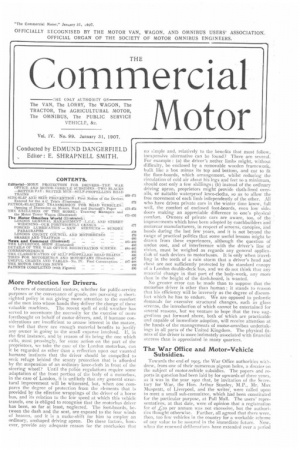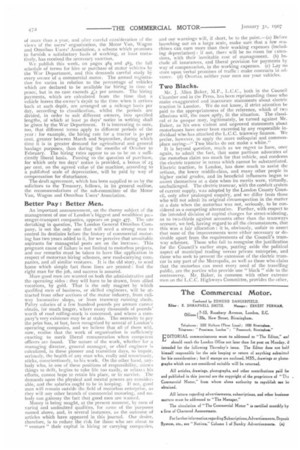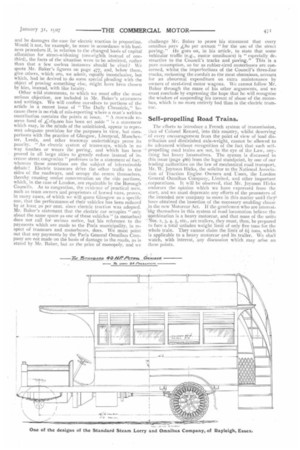More Protection for Drivers.
Page 1

Page 2

Page 3

If you've noticed an error in this article please click here to report it so we can fix it.
Owners of commercial motors, whether for public-service purposes or the conveyance of goods, are pursuing a shortsighted policy in not giving more attention to the manfort of the men into whose hands they deliver the charge of these
valuable machines. 'The recent spell of cold. weather has served to accentuate the necessity for the exercise of more forethought on behalf of motor drivers, and, if humane considerations are insufficient to arouse interest in the maliur, we feel that there are enough material benefits to justify any owner in going to the small expense involved. If, in the first instance, and by reason of its being the one which calls, most pressingly, for some action on the part of the proprietors, we take the case of the London motorbus, can it be regarded as other than a reflection upon our vaunted humane instincts that the driver should be compelled to seek refuge behind the scanty protection that is afforded by the suspension of an ordinary knee-cloth in front of the steering wheel? Until the police regulations require sonny adaptation of the front portion of the body of a motorbus, in the case of London, it is unlikely that any general structural improvement will be witnessed, but, when one COMpares the degree of protection from the elements that is provided by the effective wrappings of the driver of a horse bus, and its relation to the low speed at which this vehicle travels, one is obliged to recognise that the motorbus driver has been, so far at least, neglected. The foot-boards, between the dash and the seat, are exposed to the four winds of heaven, and it is a make-shift for him to employ an ordinary, unshaped driving apron. Do these factors, however, provide any adequate reason for the conclusion that
no simple and, relatively to the benefits that must follow, inexpensive alternative can be found? There are several. For example : (a) the driver's nether limbs might, without difficulty, be enclosed by a removable wooden framework, built like a box minus its top and bottom, and cut to fit the floor-boards, which arrangement, whilst reducing the circulation of cold air about his legs and feet to a minimum, should cost only a few shillings; (b) instead of the ordinary driving apron, proprietors might provide cloth-lined overalls, or suitable waterproof knee-cloths, so as to allow the free movement of each limb independently of the other. All who have driven private cars in the winter time know, full well, the comfort of enclosed foot-boards, even low sidedoors making an appreciable difference to one's physical comfort. Owners of private cars are aware, too, of the improvements which have been adopted by coachbuilders and motorcar manufacturers, in respect of screens, canopies, and hoods during the last few years, and it is not beyond the range of practical politics that some useful lessons might be drawn from these experiences, although the question of undue cost, and of interference with the driver's line of vision, must be weighed as regards any general applicatioh of such devices to motorbuses. It is only when travelling in the teeth of a rain storm that a driver's head and chest are not sufficiently protected by the standard canopy of a London double-deck bus, and we do not think that any material change in that part of the body-work, any more than in the height of the dash-board, is wanted.
No greater error can be made than to suppose that the motorbus driver is other than human it stands to reason that his efficiency will be inversely as the degree of discom. fort which he has to endure. We are opposed to pedantic demands for excessive structural changes, such as glass screens, the introduction of which cannot be entertained for several reasons, hut we venture to hope that the two suggestions put forward above, both of which are practicable and capable of immediate adoption, will receive attention at the hands of the managements of motor-omnibus undertakings in all parts of the United Kingdom. The physical fitness of the driver is more intimately associated with financial success than is appreciated in many quarters. "
The War Office and Motor-Vehicle Subsidies.
Towards the end of 1905, the War Office authorities withdrew, from one of their numerous pigeon holes, a dossier on the subject of motor-vehicle subsidies. The papers and reports in question had been laid by for upwards of three years, as it was in the year 1902 that, by invitation of the Secretary for War, the Hon. Arthur Stanley, M.P., Mr. Max Muspratt, of Liverpool, and the writer, were called upon to meet a small sub-committee, which had been constituted for the particular purpose, at Pall Mall. The users' representatives, at that date, were of opinion. that a registration fee of L,20 per annum was not excessive, but the authorities thought otherwise. Further, all agreed that there were, then, too few vehicles in the country for a workable scheme of any value to lw assured ill the immediate future. Now, when the renewed deliberations have extended over a period
of inure than a year, and after careful consideration of the views of the users' org,anisatioa, the Motor Van, Wagon and Omnibus Users' Association, a scheme which promises to furnish a satisfactory basis of working, at least tentatively, has received the necessary sanction.
We publish this week, on pages 484 and 485, the full schedule of terms for hire or purchase of motor vehicles by the War Department, and this demands careful study by every owner of a commercial motor. The annual registration fee varies in relation to the percentage of vehicles which are declared to be available for hiring in time of peace., but in no case exceeds i.;2 per annum. The hiring payments, which are calculated from the time that :t vehicle leaves the owner's depot to the time when it arrives back at such depot, are arranged on a mileage basis per day, according to classification, whilst the periods are divided, in order to suit different owners, into specified lengths, of which at least 30 days' notice in writing shall be given by the War Department. It is interesting to note, too, that different terms apply to different periods of the year : for example, the hiring rate for a tractor is 50 per cent, greater between March and September, during which time it is in greater demand for agricultural and general haulage purposes, than during the months of October to February. The hiring rates appear to us to be on a sufficiently liberal basis. Passing to the question of purchase, for which only ten days' notice is provided, a bonus of 25 per cent, on the agreed value of the machine, according to a published scale of depreciation, will be paid by way of compensation for disturbance.
The draft agreement, which has been supplied to us by the solicitors to the Treasury, follows, in its general outline, the recommendations of the sub-committee of the Motor Van, Wagon and Omnibus Users' Association.
Better Pay : Better Men.
An important announcement, on the thorny subject of the management of one of London's biggest and wealthiest pa:;senger-transport companies, appears on page 477. The undertaking in question, The London General Omnibus Company, is not the only one that will need a strong man to control its destinies before the history of commercial motoring has two years added to it, for we perceive that unsuitable aspirants for managerial posts are on the increase. 'Phis pregnant cause of failure is not limited to motorbus projects, and our remarks must be taken to have like application ;
..0T1 .11
respect of motorvan hiring schemes, new road-carrying companies, and all similar ventures. It is the old story, to send home which simple fact these lines are penned : find the right man for the job, and success is assured.
More good men are wanted on both the administrative and the operating sides : they will have to be drawn, from allied vocations, by gold_ That is the only magnet by which qualified men of business, or skilled engineers, will be attracted from other sections of the motor industry, from railway locomotive shops, or from tramway running sheds. Paltry salaries of a few hundred pounds per annum cannot obtain, for much longer, where many thousands of pounds' worth of road rolling-stock is concerned, and where a company's very existence may be at stake. The necessity to pay the price has, at last, been recognised by several of London's operating companies, and we believe that all of them will, now, realise that the work of organisation is sufficiently exacting to merit liberal remuneration when competent officers are found. The nature of the work, whether for a managing director, general manager, or chief engineer is calculated, in these pioneer and transition days, to impair, seriously, the health of any man who, really and tenaciously, sticks, conscientiously, to his work. On the other hand, anybody who, in one of these positions of responsibility, :Mows things to drift, begins to take life too easily, or relax( s his efforts, cannot hope to retain his place, or to survive. The demands upon the physical and mental powers are consideeable, and the salaries ought to be in keeping. If not, good men will remain outside the field of motorbus enterprise, as they will any other branch of commercial motoring, and nobody can gainsay the fact that good men are wanted.
Money is being sought, at the present moment, by men of varied and undoubted qualities, for some of the purposes named above, and, in several instances, as the outcome of articles which have appeared in this journal. Our desire, therefore, is to reduce the risk for those who are about to " venture " their capital in hiring or carrying companies,
and our warnings will, if short, be to the point.—(a) Before launching out on a large scale, make sure that a few machines can earn more than their working expenses (including depreciation) : if not, there will be no room for extensions, with their inevitable cost of management. (b) Include all insurances, and liberal provision for payments by way of compensation, in the working expenses. (c) Lay no store upon verbal promises of traffic : make contracts in advance. (d) Overtax neither your men nor your vehicles.
Two Blacks.
Mr. J. Allen Baker, M.P., L.C.C., both in the Council Chamber and in the Press, has been reprimanding those who make exaggerated and inaccurate statements about electric traction in London. We do not know, if strict attention be paid to the appropriateness of the reference, which of two allusions will, the inure aptly, lit the situation. The classical et to quoque may, legitimately, be turned against Mr. Baker, as his own violent and unproved statements about motorbuses have never been exceeded by any responsible individual who has attacked the L.C.C. tramway finance. We prefer, however, to apply the more colloquial and commonplace saying—" Two blacks do not make a white."
It is beyond question, much as we regret to have, once again, to admit the fact, that some partisan advocates of the motorbus claim too much for that vehicle, and condemn the electric tramcar in terms which cannot be substantiated. Electric traction, in London, has done much to assist the artisan, the lower middle-class, and many other people in higher social grades, and its beneficial influences began to assert themselves at a date when its merits were, virtually, unchallenged. The electric tramcar, with the conduit system of current supply, was adopted by the London County Council, only after prolonged enquiry, and we differ from those who will not admit its original circumspection in the matter at a date when the motorbus was not, seriously, to be considered as a competing alternative. Further, with respect to the intended division of capital charges for street-widening, as to two-thirds against accounts other than the tramways account, we feel, having regard to all the circumstances, that this was a fair allocation : it is, obviously, unfair to assert that none of the improvements were either necessary or desirable apart from the requirements of the Council's tramway schemes. Those who fail to recognise the justification for the Council's earlier steps, putting aside the political aspect of municipal trading versus private enterprise, and those who seek to prevent the extension of the electric tramcar in any part of the Metropolis, as well as those who claim that the motorbus can meet every need of the travelling public, are the parties who provide one " black " side to the controversy. Mr. Baker, in common with other extreme men on the L.C.C. Highways Committee, provides the other,
and he damages the case for electric traction in proportion. Would it not, for example, be more in accordance with business procedure if, in relation to the changed basis of capital allocation for street-widening (one-eighth instead of onethird), the facts of the situation were to be admitted, rather than that a few useless instances should be cited? We quote Mr. Baker's figures on page 477, and, below them, give others, which are, we admit, equally inconclusive, but which, had he desired to do some special pleading with the object of proving something else, might have been chosm by him, instead, with like fatuity.
Other wild statements, to which we must offer the most serious objection, are included in Mr. Baker's utterances and writings. We will confine ourselves to portions of the article in a recent issue of " The Daily Chronicle," because there is no risk of mis-reporting where a man's written contribution contains the points at issue. " A renewals reserve fund of 4-169,000 has been set aside " is a statement which may, in the minds of the uninitiated, appear to represent adequate provision for the purposes in view, but comparisons with the practice of Glasgow, Liverpool, Mancheter, Leeds, and other tramway undertakings prove its paucity. " An electric system of tramways, which in no way touches or wears the paving, and which has been proved in all large cities to greatly reduce instead of increase street congestion " profegses to be a statement of fact, whereas these assertions are the subject of iriterminable debate! Electric tramcars drive the other traffic to the sides of the roadways, and occupy the centre themselves, thereby causing undue concentration on the side portions, which, in the case of London, are repairable by the Borough Count-its, As to congestion, the evidence of practical men, such as team owners and proprietors of horsed vans, proves, in many cases, of which we will quote Glasgow as a specific: one, that the performance of their vehicles has been reduced by at least 20 per cent, since electric traction was adopted. Mr. Baker's statement that the electric car occupies " only about the same space as one of these vehicles " (a motorbus) does not call for serious notice, but his reference to the payments which are made to the Paris municipality, in respect of tramcars and motorbuses, does. We must point out that any payments by the Paris General Omnibus Company are not made on the basis of damage to the roads, as is stated by Mr. Baker, but as the price of monopoly, and we challenge Mr. Baker to prove his statement that every omnibus pays j;80 per annum "for the use of the street paving." He goes on, in his article, to state that some vehicular traffic (e.g., motor omnibuses) is " especially destructive to the Council's tracks and paving." This is a pure assumption, so tar as rubber-tired motorbuses are concerned, whilst the imperfections of the Council's three-line tracks, reckoning the conduit as the most obnoxious, account for an abnormal expenditure on extra maintenance by owners of steel-tired motor wagons. We cannot follow Mr. Baker through the maze of his other arguments, and we must conclude by expressing the hope that he will recognise the wisdom of suspending his torrent of abuse of the .motorbus, which is no more entirely bad than is the -electric tramcar.
Self-propelling Road Trains.
The efforts to introduce a French system of transmission, that of Colonel Renard, into this country, whilst deserving of every encouragement from the point of .view of load distribution and diminished .axle-weight, cannot be allowed to be advanced without recognition of the fact that such selfpropelling road trains are not, in the eye of the Law, anything but heavy locomotives. The system is discussed in this issue (page 486) from the legal standpoint, by one of our leading authorities on the law of mechanical road transport, Mr. W. Joynson Hicks, the solicitor to the National Association of Traction Engine Owners and Users, the London General Omnibus Company, Limited, and other important corporations. It will be observed, that Mr. Joynson Hicks endorses the opinion which we have expressed from the start, and we must deprecate any efforts of the promoters of the intended new company to move in this matter until they' have obtained the insertion of the necessary enabling clause in the new Motorcar Act. If the gentlemen who are interesting themselves in this system of road locomotion believe the combination is a heavy motorcar, and that none of the units Nos. 2, 3, 4, 5, etc., are trailers, they must, then, be prepared to face a total unladen weight limit of only five tons for, the whole train. They cannot claim the limit of 61tons, which is applicable to a heavy motorcar and its trailer. We shall watch, with interest, any discussion which may arise on these points.






















